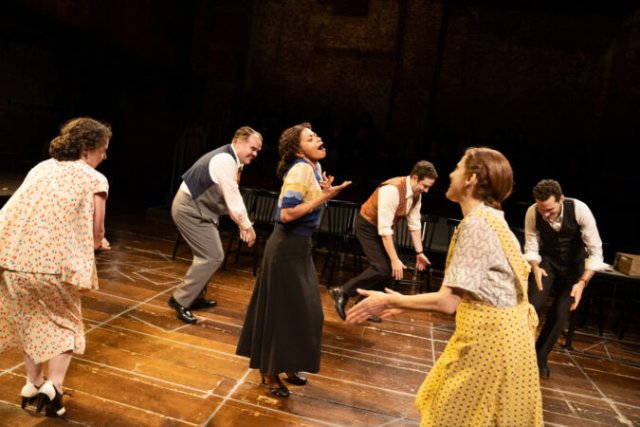I Can Get It for You Wholesale
Classy Revival by Classic Stage Company.
By: Karen Isaacs - Nov 27, 2023
Harry Bogen can charm anyone to believe anything. Just don’t believe a word he is saying. Amoral could be his middle name — or perhaps sociopath. The only one he seems to care about, besides himself, is his mother, and you aren’t too sure about that. Yet, every so often, you like him. He is self-aware that he is lying, double-crossing, cheating, and destroying everyone in his path.
Santino Fontana manages to make this user just charming enough – and transparent enough – that you can’t hate him, but you also get annoyed that so many fail to see the obvious.
I Can Get It for You Wholesale is getting a fine and rare revival by the Classic Stage Company. The musical with a book by John Weidman based on his novel of the same name and music and lyrics by Harold Rome. most known now for propelling Barbra Streisand to everyone’s attention. She played Harry’s secretary and stopped the show with “Miss Marmelstein.” But the cast in 1962 also featured Elliott Gould as Harry, Lillian Roth as his mother, Bambi Lynn and Sheree North.
At the same time that How to Succeed in Business was making the schemer J. Pierpont Finch, roguish and charming, I Can Get It for You Wholesale offers no real redeeming qualities for Harry.
It is 1937 and Harry has been told by relatives that his Jewish background closes the door on many professions. But the garment trade is one where the door is wide open.
It is set in the garment industry, where Harry begins as someone who pushes the racks of clothing from one place to another. He sees an opportunity when the others strike to make his boss a proposition: he is setting up his own company and will do the work. Of course, he doesn’t have the start-up funds but uses a friend to provide it.
From there, he is onward and upward, leaving a path of destruction in his wake. Soon, he enlists a top salesperson and a designer from his original boss to set up his own clothing manufacturing operation. Again, he gets his share of the start-up funds by manipulating his shipping company partner to buy him out and an inflated price. It is supposed to be a partnership, but Harry runs the show.
Harry strings along his girlfriend, Ruthie, while hooking up with other women who are similar to Harry – willing to use anything and anyone to get what they want. In particular, he is enamored of Martha, a Follies star. He showers her and himself with luxury items, but where do the funds come from?
As it all falls apart, one partner determines the truth and Harry destroys the other man’s life.
Yet, in the end, Harry seems poised to go even higher.
Classic Stage Company (on East 13th Street) has assembled a top-drawer cast along with director Trip Cullman and choreographer Ellenore Scott. They use the small rectangular stage to their advantage. Seare minimal – tables and desk chairs that are moved about to create the various scenes.
Julie Lester makes “Miss Marmelstein” her own; no shadows of Barbra; her rendition of “What Are They Doing to Us” in act two was equally good. Judy Kuhn, as Harry’s mother, conveys the conflict between loving her son and knowing that he is destroying people. At one point, she hints that he is like her which makes you want to know more about what she means.
Harry’s longtime girlfriend, Ruthie (Rebecca Naomi Jones), is terrific with the beautiful song, “On My Way to Love.”
In fact, for a show about greed, dishonesty, and manipulation, Rome wrote several terrific ballads. Ruthie gets another great song in “Who Knows.” In addition, there is “Have I Told You Lately,” sung by Harry’s partner Meyer (Adam Chandler-Berat) and his wife Blanche (Sarah Steele). Berat is convincing as the clothing designer who is all too willing to trust Harry.
But the cynicism comes out in songs like “The Sound of Money,” “Grab Them While I Can,” “Love Is Not Enough,” and “What’s In It for Me?” Several of these feature Harry and his showgirl squeeze, Martha played by Joy Woods.
You can see why this show had a respectable run on Broadway in 1962; you can also understand why it didn’t run longer.
It’s tough to root for the user, and sometimes even tougher to sympathize with those who won’t open their eyes to what he is doing.

